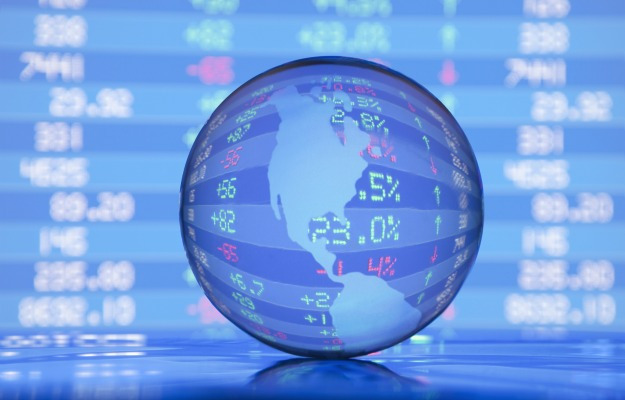In the past week, stock markets around the world have been roiled by a massive crisis of confidence. New York’s Dow Jones Industrials fell 17 per cent for the week, its sharpest weekly decline since 1987. Other leading indexes of Europe: FTSE (London), DAX (Frankfurt), CAC (Paris), and even those of Asia: Nikkei (Tokyo), Hang Seng (Hong Kong), Kospi (Korea), have followed suit. For the year 2008, the Dow Jones index is down 36% losing $8.3 trillion of market value. What started as a subprime mortgage crisis in the USA has now gone global and engulfed all the G-7 countries and more.
TIME magazine called it “the complete unraveling of the world’s financial system”. Needless to say, we are in the midst of an economic crisis of unprecedented scale. And the crisis is still unfolding. We have not seen the end game yet. What is clear is that the origin of the problem lies in the developed countries of Europe and America. Are the leaders and finance ministers in those countries doing enough of the right stuff to put the world financial markets back on track? They have an opportunity this weekend as the World Bank-IMF meetings get under way in Washington.
As we now know, it all started with the burst of the housing bubble in the US resulting in widespread default that landed many high-flying financial institutions into bankruptcy. Apparently, these institutions, including Wall Street icons like Lehman Brothers, Bear Sterns, Merryl Lynch were loaded with mortgage-backed securities which lost value precipitously. With depleted assets in both banks and financial institutions, capital shortfalls became endemic. A crisis of confidence among banks led to inter-bank credit squeeze that soon extended to consumers and businesses. Asset prices sank even further. The crisis that was brought about by accumulation of “over-leveraged” debt seemed to aggravate via “deleveraging”. The financial markets have cried out for infusion of capital to break the vicious circle. The problem at hand is unprecedented. Its solution will have to be unprecedented as well.
The past few days have witnessed a flurry of activities in Washington and European capitals. The global financial system was under severe strain, and swift action was called for. One thing seems clear in the various actions that have been taken. Conservatives and liberals on both sides of the Atlantic have wasted no time to shed their dogmatic positions on what to do with the capitalist market system. The world has been better served by their realization that this was not the time for dithering, but swift and determined action by all. Prognosis and post-facto analysis could be done later.
In the US, House Republicans, who are fundamentally opposed to any intervention in the financial markets, had to bite the bullet and give in to a historic scheme of what might be described as “pseudo nationalization of Wall Street”. The $700 billion emergency bailout package was finally signed off by President George Bush, though, for the time being, it did not do much to stabilize equity markets in the US or around the world. In a similar move, the British Prime Minister Gordon Brown went a bit further and signed off a straight-jacket infusion of £50 billion of capital into UK banks. Around Europe, governments stepped forward to guarantee the savings of depositors to prevent run on banks. To inject liquidity into the financial markets, what appeared unprecedented was a coordinated move by central banks of the US, the UK, the ECB, and others to cut interest rates by 0.5 percent. Even China and Korea chimed in. In a surprising move, the Government of Iceland fell short of declaring that their whole economy was bankrupt and sought a $5.0 billion loan from Russia.
For good or bad, recent events in the financial markets around the globe tell us that financial globalization has taken deep roots. In consequence, we see equity and financial markets gyrate in unison, with good and bad times shared across borders. It takes little time for a national problem to go global. So, to fix the problem requires globally managed coordination of actions. Unilateral action under these circumstances is unlikely to bear fruit.
In Bangladesh, the question in our mind should be whether our savings and investment in the country are secure under these circumstances. Is our financial sector under sound regulation so as to fend off any onslaught from abroad? How integrated are we with the global economy?
Back in 1997, when the Asian financial crisis battered the economies of Thailand, Malaysia, Indonesia, Korea and Taiwan, Bangladesh remained largely immune to that crisis because of one principal barrier: absence of capital account convertibility, which precluded free movement of capital in and out of the financial system. There was no question of “hot money” going in and out of Bangladesh. That situation has not changed to this day, as the capital account of the balance of payments remains non-convertible. Our financial sector is not exposed to those infamous CDOs (collateralized debt obligations) which became the bane of the Euro-American financial sectors. So an onslaught on our financial system seems unlikely. As Asian stock markets tank in tandem with those in US and Europe, Bangladesh stocks might react, in sympathy, rather than because of market integration. Unlike China, which surprisingly kept a fifth of its US currency holdings in mortgage-backed securities held by Fannie Mae and Freddie Mac – two mortgage giants in US that were recently taken over by US Treasury – we trust theBangladesh Bank holds its $5.5 billion dollar reserves almost entirely in cash and safe US Treasury securities. Likewise, it is believed that the roughly $500 million of foreign currency holdings of our private banks are not held in any speculative assets abroad. If there are any doubts, this would be the time for BB to scrutinize the quality of these holdings.
Finally, it is important to recognize that adverse developments in the financial sector will eventually impact the real economy of goods, services and jobs through its impact on “aggregate consumption expenditure”. The depth of this linkage and periodicity of the transmission mechanism is not clearly known. True, Bangladesh economy today is much more integrated with the world market for goods and services. One indicator of this integration – the trade-GDP ratio has doubled, from 20% in 1990 to 40% today. The forecasts of a deep recession – if not a depression – appears widespread in the developed economies, where most of our exports (e.g. garments and frozen foods) are destined. If a protracted recession is inevitable, its negative impact on our burgeoning garment exports will eventually be felt. That would mean a slowdown in the double digit growth rates of our garment exports in the short- to medium-term. However, if the global recession is brief – i.e. if all the firefighting by global leaders prove effective – we should be able to ride out the wave of uncertainty with minimal damage, thus keeping jobs and income in tact at home. The fact that our RMG exports feed the low end of markets in US and Europe might be a saving grace in these circumstances, as demand for this market segment is relatively less elastic and revenues thereof less volatile compared to the high-end market segment. Remittance inflows might be affected modestly from the current crisis as the main source of this inflow is the Middle East and Malaysia rather than Europe and America. Jobs of our migrant workers in the Middle East might be mildly at risk though I would think declines in oil prices will only shave off some of the windfall gains of petroleum exporters leaving economic expansion programs in tact. On the flip side, a global recession is likely to depress oil and other import prices to our advantage.
To be honest, nobody has a crystal ball to predict precisely how things are going to end and how they are going to affect the Bangladesh economy. It would be counter-productive to raise alarm bells without sufficient facts at our disposal. We can only draw rational inferences based on economic principles and historical evidence. As I said at the outset, the crisis is still unfolding, and chances are that things might get worse before getting better. In the circumstances, a prudent advice would be to fasten our seatbelts and stay calm for the upcoming bumpy ride.







